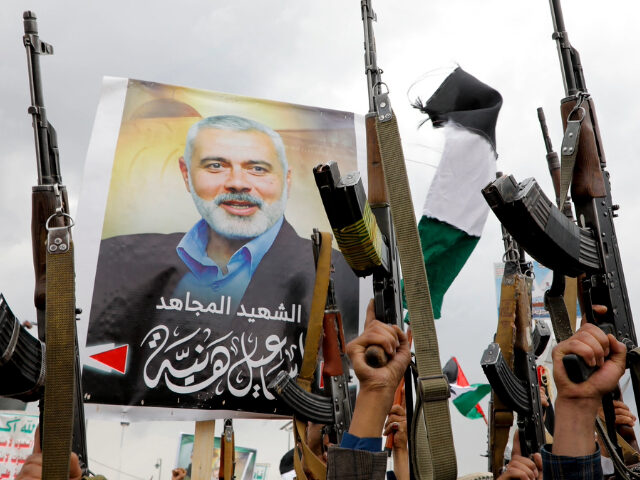The leader of the Ansarullah Yemeni terrorist organization, Abdul-Malik al-Houthi, lamented the “big loss” of Hamas “political” chief Ismail Haniyeh on Thursday, vowing revenge after his departure “greatly impacted” the Middle East.
Al-Houthi’s admission that the elimination of Haniyeh from the battlefield had a significant positive impact on the war on jihadists in the Middle East follows a comment from American President Joe Biden that his death was not helpful, as well as his administration’s refusal to directly answer if Hamas losing its most important liaison to top allies — such as the regimes of Iran and Turkey — made the world a better place.
WATCH: Biden Says Killing of Hamas Leader “Has Not Helped”
C-SPANHaniyeh, who lived a luxurious life in Qatar and traveled frequently to secure funding and political support from regional Islamists, died on July 31 in his lodgings in Tehran, Iran. The Hamas leader was in the Iranian capital for the inauguration of President Masoud Pezeshkian and had met with both Pezeshkian and the true powerholder in Iran, “supreme leader” Ayatollah Ali Khamenei, hours before an explosion ripped through his room, turning the presumed assassination into an embarrassment for the Iranian government.
At the time of his death, Haniyeh was a critical actor for Hamas, as he was in charge of brokering relationships with key backers — such as Iran and Turkey — as well as attempting to pressure Israel into an agreement to end its self-defense operations against Hamas in Gaza. Israel declared war on Hamas after October 7, 2023, when Hamas terrorists invaded Israel and engaged in a spree of rape, torture, abduction, infanticide, and other crimes against civilians, killing an estimated 1,200 people. About 100 people are believed to be in Hamas captivity at press time.
WHAT YOU NEED TO KNOW: Horror of the Hamas Terror Attack on Civilians at Kibbutz Be’eri in Israel
Iran immediately blamed the government of Israel, with American backing, for Haniyeh’s death. Israel has neither confirmed nor denied responsibility, while the Biden administration claimed it had no foreknowledge of any plots or involvement in the explosion. Iranian leaders have also vowed to retaliate with a devastating attack on Israel but have yet to act at press time.
Iranian officials have also denied reports that a bomb planted in the room killed Haniyeh, insisting that an airstrike killed him. Tehran has not offered any evidence, nor has evidence surfaced independently, of projectiles in the sky before the explosion.
Al-Houthi, who typically addresses the captured nation of Yemen on Thursdays, took time out of his weekly speech to honor Haniyeh’s memory at the helm of one of the world’s most vicious terrorist groups.
“The Zionist regime’s crime of assassinating Hamas leader Ismail Haniyeh and Hezbollah commander Fuad Shukr has greatly impacted the region’s state of affairs,” al-Houthi said, according to the Iranian state outlet PressTV. “The enemy’s latest acts of aggression have targeted the Muslim Ummah’s leaders and dignitaries, who played starring roles in running up the flag of struggle against Islam’s and Muslims’ foes.”
Shukr died the same week as Haniyeh. The Israel Defense Forces (IDF) confirmed a “targeted, intelligence-based elimination” on July 30 of the Hezbollah second-in-command, believed to have played a role in a long list of terrorist attacks, including against American forces. Hezbollah had attacked northern Israel days prior, killing 12 children at a youth soccer game.
Al-Houthi described Haniyeh’s death as a “big loss” but congratulated associated jihadist leaders for allegedly uniting in the face of his departure.
“The horrendous assassination of Haniyeh was met with the absolute cohesion of the Hamas resistance movement,” the Houthi leader claimed. “While the enemy had wished to undermine the group’s resilience and steadfastness and wreak its decision-making power, Hamas continues its activities coherently.”
“Despite the big loss of Haniyeh, there is no discord, weakness, or retreat from fundamental positions within Hamas,” al-Houthi asserted.
All-Houthi’s remarks were more categorical in calling Haniyeh’s death a loss — and thus a net positive for Israel and its allies — than the Biden administration’s. Biden himself appeared to condemn his killing in remarks in early August, saying he was “very concerned” it would lead to escalation. Asked by reporters if Haniyeh’s death hurt the chances of a ceasefire deal, Biden said it “has not helped.”
During an interview on August 2, White House National Security Communications Adviser John Kirby chose not to answer directly when asked if the “world is a better place” without Haniyeh.
“I think it’s important that we focus on getting the ceasefire deal,” Kirby replied. “You know what would make for a better Middle East? Is getting a ceasefire deal in place.”
Secretary of State Antony Blinken swiftly distanced the Biden administration from the Tehran explosion in late July, telling reporters, “This is something we were not aware of or involved in.” Like Kirby, Blinken insisted on focusing on ceasefire talks to “help end the suffering of Palestinians in Gaza.”
“It’s vitally important to get the hostages home, including a number of Americans. It’s vitally important to, hopefully, put things on a better path for more enduring peace,” Blinken said, “and more enduring security, so that focus remains, and, again, speculating on the impact of any one event, I’ve learned, is not a not a wise thing to do.”

COMMENTS
Please let us know if you're having issues with commenting.